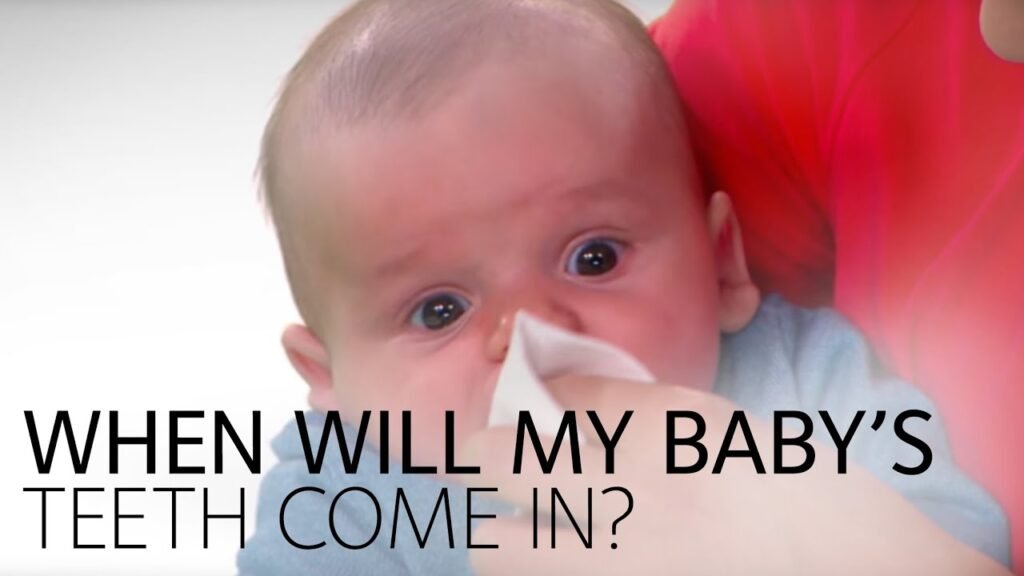Baby Teething: When to Expect Those First Teeth

Babies start teething at around 6 months of age, but the timing can vary from child to child. Teething can be a challenging time for both babies and parents, as the discomfort and irritability that often accompany it can make everyone feel on edge. Understanding when your baby's teeth are likely to come out can help you better prepare for this stage of their development and know when to expect those first adorable little pearly whites to make an appearance. So, when do babies teeth come out? Let's explore the answer in this article.
- Babies typically start teething around 6 months of age.
- The lower front teeth (central incisors) are usually the first to come in.
- Most babies will have a full set of primary (baby) teeth by the age of 3.
- Teething can cause symptoms such as drooling, irritability, and chewing on objects.
- It's important to care for baby teeth as soon as they come in to prevent decay and maintain oral health.
What is the typical age for a baby's first teeth to come in?
Teething typically starts around 3 months, but the average age for a baby's first teeth to come in is between 4 and 7 months. The central incisors, or the two bottom front teeth, are usually the first to appear. It's important to remember that every baby is different, so some may start teething earlier or later than others.
During the teething process, your baby may experience symptoms such as drooling, irritability, and chewing on objects. It's important to provide your little one with teething toys or a clean, damp washcloth to help soothe their gums. If your baby is experiencing a lot of discomfort, you can also talk to your pediatrician about using infant pain relief medication.
As your baby's teeth continue to come in, it's important to establish good oral hygiene habits early on. Start gently cleaning your baby's gums with a soft cloth or infant toothbrush, and schedule their first dental appointment by their first birthday. By taking care of your baby's oral health from the start, you can help set them up for a lifetime of healthy smiles.
How much time does it take for baby teeth to come in?
Babies typically begin teething between 6 and 9 months, with the bottom central incisors being the first to emerge. These are the two front teeth on the bottom of the mouth. However, it is not uncommon for primary teeth to appear later than 9 months.
Is your 3 month old teething?
If your 3 month old is showing signs of teething, such as increased drooling, putting fingers in their mouth, or a swollen gum area, it is possible that they are indeed teething. However, it's important to remember that these symptoms can also be present for other reasons, so it's always best to consult with your pediatrician for a proper diagnosis. Keeping your baby comfortable with teething toys or a cold washcloth to chew on can help provide relief during this potentially uncomfortable time. Remember, every baby is different, so it's important to pay attention to their individual cues and behaviors.
Teething can be a challenging time for both babies and parents, but knowing the signs and symptoms can help you better understand and support your little one during this stage. Keep an eye out for excessive drooling, hand-chewing, and swollen gums, as these are common indicators of teething. Remember to be patient and provide comfort to your baby as they navigate this milestone in their development.
Understanding Baby Teething: A Guide for Parents
Is your baby experiencing excessive drooling, irritability, and trouble sleeping? These could be signs of teething. Understanding the process of baby teething can help parents navigate this challenging phase. Teething typically begins around 6 months of age, as your baby's first teeth start to emerge. Providing your baby with teething toys, gentle gum massages, and cool, soft foods can help alleviate discomfort. It's important to remember that every baby is unique, so be patient and offer plenty of love and support during this time.
As a parent, it's important to educate yourself on the signs and symptoms of teething so you can provide the best care for your baby. Keeping a close eye on your baby's behavior and providing comfort when needed can make a big difference during the teething process. Remember, teething is a natural and temporary phase, and with the right knowledge and support, you can help your baby navigate it with ease.
Navigating the Teething Timeline: What to Expect
Navigating the teething timeline can be a challenging journey for both parents and babies alike. From around six months old, your little one may start experiencing discomfort and irritability as their first teeth start to emerge. This process typically continues until they have a full set of primary teeth by the age of three. During this time, you can expect your baby to drool more, chew on objects, and experience disrupted sleep. By understanding what to expect and providing soothing remedies such as teething toys or cool washcloths, you can help ease your child's discomfort and navigate this milestone with confidence.
In essence, understanding when babies start teething is crucial for parents to provide the necessary care and support during this developmental milestone. By being aware of the signs, symptoms, and remedies for teething discomfort, caregivers can help their little ones navigate this phase with comfort and ease. Remember, every baby is different, so patience and compassion are key as they embark on this teething journey.